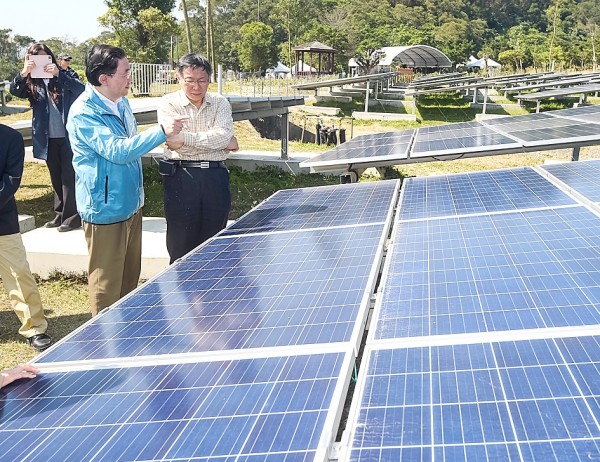《TAIPEI TIMES 焦點》 Taipei touts new solar power plant

Taipei Mayor Ko Wen-je, right, listens as Taipei Department of Environmental Protection Commissioner Liou Ming-lone speaks at the Taipei Energy Hill photovoltaic power plant in Muzha yesterday. Photo: Huang Yao-cheng, Taipei Times
By Sean Lin / Staff reporter
The Taipei City Government yesterday held a launch ceremony for a photovoltaic power plant named Taipei Energy Hill, which is capable of generating 2 megawatt-hours of electricity per year.
The power plant in the Fudekeng Environmental Restoration Park in the city’s Muzha (木柵) area, is built on the site of of a former landfill and consists of 8,000 solar panels covering about 3 hectares.
The electricity generated by the plant would help the city reduce yearly carbon dioxide emissions by 1,000 tonnes, which is three times the amount that Daan Forest Park can absorb in a year, the Taipei Department of Environmental Protection said.
The department in July last year signed a contract with Taipei-based Tatung Co (大同), a leader in the nation’s photovoltaic industry, to build the power plant.
Touting the facility as a model for “green” electricity generation, Taipei Mayor Ko Wen-je (柯文哲) said at the ceremony that the power plant has generated 153,000 kilowatt-hours of electricity since it went online last month, which translates into an about 80-tonne reduction in carbon dioxide emissions.
The city provided the land on which the power plant was built and Tatung provided the photovoltaic panels, Ko said.
The electricity generated by the plant would be sold to state-run Taiwan Power Co (Taipower, 台電), he said.
According to the contract, Tatung is to pay the city government 10 percent of the revenue it makes from selling electricity, which costs about NT$5 per kilowatt-hour, which is like “rent” paid by the firm, the mayor said.
To boost solar energy generation, the city government has contracted out two projects to Tatung to install solar panels on the roofs of central and city government agencies, Ko said.
In other news, Ko yesterday fielded media questions about illegally built mezzanines in Neihu District (內湖).
The Chinese-language Liberty Times (the Taipei Times’ sister newspaper) yesterday reported that the city government has made an exception for the district to legalize the mezzanines by allowing property owners to pay a fee for the additional floor space.
Ko took issue with the word “legalize,” saying the city government would ensure that owners pay fees that apply to extra floor space created by mezzanines, adding that structures that do not conform to regulations would be torn down.
If property owners do not contact the city government by July 1, the structures would be torn down, he said.
Taipei Construction Management Office spokesman Horng Der-haur (洪德豪) said people started building mezzanines in Neihu in the early 2000s after the former industrial zone was designated as a science park, which allowed offices and stores to be established.
As a result, people who own factories with raised ceilings built mezzanines into their houses and rented them out, he said.
There are 147 units in 52 buildings in Neihu with illegal mezzanines, he said.
新聞來源:TAIPEI TIMES













